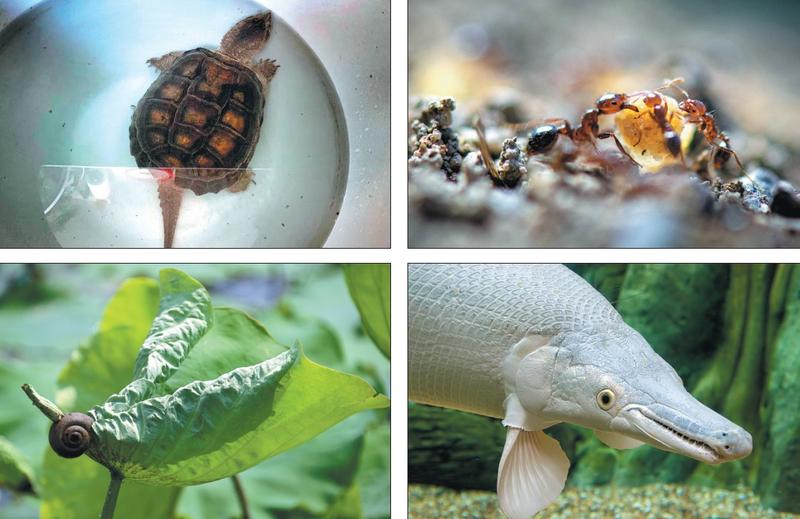 Some 660 invasive species have been detected in China, including turtles, red fire ants, white alligator eels and Pomacea canaliculata, a type of snail. (PROVIDED TO CHINA DAILY AND XIAO YUANYANG/FOR CHINA DAILY)
Some 660 invasive species have been detected in China, including turtles, red fire ants, white alligator eels and Pomacea canaliculata, a type of snail. (PROVIDED TO CHINA DAILY AND XIAO YUANYANG/FOR CHINA DAILY)
Xi Jinping, general secretary of the Communist Party of China Central Committee, called on Sept 29 for stronger measures to prevent and curb biological risks, stressing the need to build up the nation’s governance system and capacities to establish a sturdy biological shield.
In remarks made at a group study session of the Political Bureau of the CPC Central Committee, Xi reiterated the importance of biosecurity, a key component of overall national security, saying that the issue is vital to people’s health, the long-term stability of the country and the sustained development of the Chinese nation.
The session was held after China’s first Biosecurity Law came into force in April, a move seen by many experts as a milestone in upholding the rule of law in areas critical to people’s health, the environment and national security.
Xi highlighted at the session the remaining weaknesses in China’s risk management and governance system against biological risks, with traditional and new biosecurity issues becoming more connected and domestic and overseas biological risks becoming increasingly interrelated.
It is important to further improve the nation’s governance system in the area, with measures to step up strategic and forward-looking research and planning and improve national biosecurity strategies, he said.
He urged comprehensive efforts in legislation, law enforcement, judicial procedures, raising the public’s legal awareness and ensuring compliance, saying that more should be done to improve the nation’s system of laws and regulations and systemic guarantees.
It is imperative to scale up systematic governance and whole-chain containment, build up the monitoring and early warning network targeting biological risks and prioritize the development of monitoring stations at grassroots levels, Xi said.
The goal is to enable the quick detection and identification of new contagions, new outbreaks in plants and animals, drug resistance of microorganisms and other risks, and to enable early discovery, early warning and early response, he said.
The general secretary called for efforts to establish and improve contingency plans for emergencies in biosecurity and to improve first-response mechanisms, urging heightened efforts in ensuring adequate reserves of emergency response materials and capacities.
The nation must take proactive preventive measures to cut down the transmission paths for zoonoses — diseases that can be transmitted to humans from animals — from their origins, rolling out more targeted and effective measures and improving the mechanisms for animal and plant disease prevention and control at the grassroots level, he said.
He underlined the necessity for more stringent quarantine measures, saying that more should be done to analyze potential risks and punish wrongdoing.
The nation must reinforce biosafety management of pathogenic microorganism laboratories, which must strictly carry out relevant protocols, standards and manage samples, lab animals and waste in a stringent manner, he said.
Xi stressed the importance of bolstering the innovation and industrial application of biotechnologies, saying the nation must work toward self-reliance and a stronger capacity in science and technology regarding biosecurity.
To promote the healthy development of biotechnology, the nation will promote the industrialized application of breeding and biopharmaceutical technologies based on the premise of respecting science.
Xi pledged that China would take an active part in global biosecurity governance and work with the global community to respond to mounting risks in the area, including measures to enhance bilateral and multilateral cooperation and exchanges on policymaking, risk evaluation, emergency response, information sharing and capacity building.
He underlined the need to ensure the nation’s successful hosting of the 15th meeting of the Conference of the Parties to the Convention on Biological Diversity, known as COP 15, and conduct origin tracing of COVID-19 based on scientific principles and rules.


